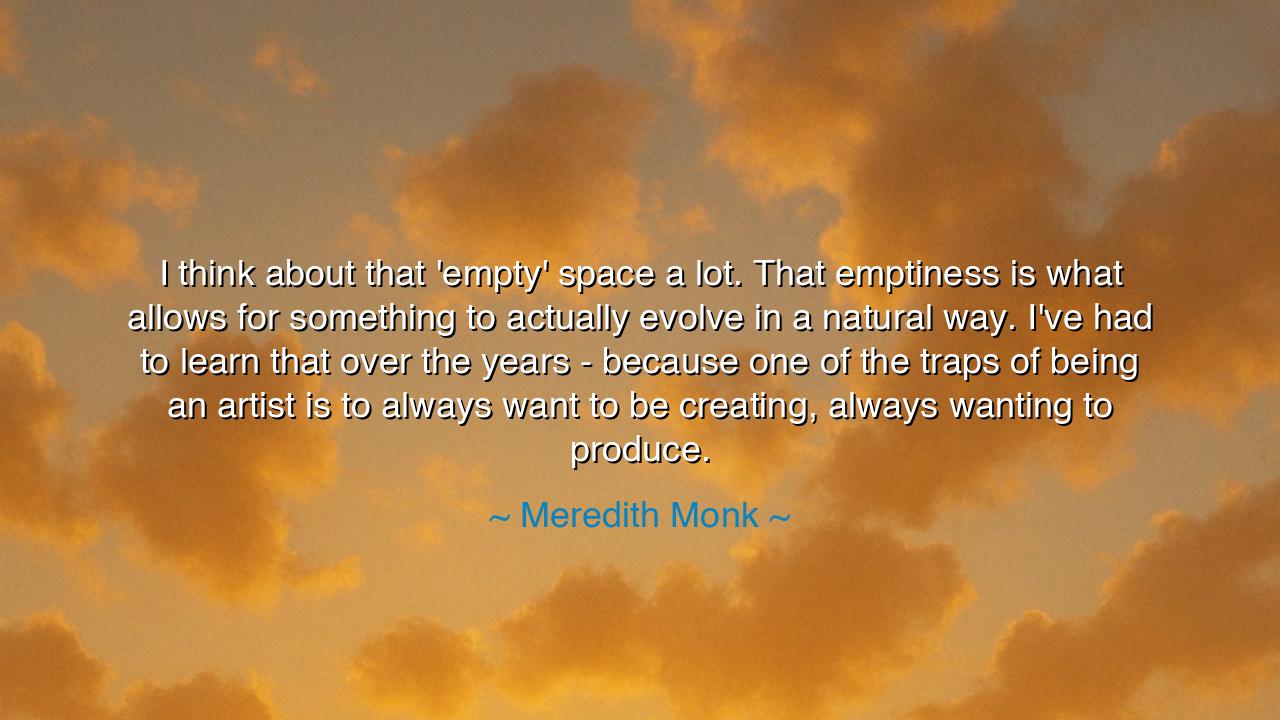
I think about that 'empty' space a lot. That emptiness is what
I think about that 'empty' space a lot. That emptiness is what allows for something to actually evolve in a natural way. I've had to learn that over the years - because one of the traps of being an artist is to always want to be creating, always wanting to produce.






Meredith Monk, visionary artist and weaver of silence into sound, spoke thus: “I think about that ‘empty’ space a lot. That emptiness is what allows for something to actually evolve in a natural way. I've had to learn that over the years—because one of the traps of being an artist is to always want to be creating, always wanting to produce.” These words strike at the heart of the creative struggle and open a window into a truth deeper than art itself. For Monk, emptiness is not absence, but fertile ground, the silent soil from which the new may spring.
In a world that urges constant action, relentless labor, and endless production, the artist often feels compelled to fill every moment with creation. Yet Monk reminds us that emptiness is not failure, nor is silence defeat. Rather, it is the pause that makes music possible, the stillness that allows movement to emerge, the space in which life itself can evolve. Without the quiet of winter, there can be no spring; without rest, the field cannot bear new fruit. So too in the soul of the artist, emptiness is the womb of becoming.
History offers us echoes of this wisdom. Consider the story of Michelangelo, summoned to paint the ceiling of the Sistine Chapel. Before his brush ever touched plaster, he spent long seasons in contemplation, staring at blank walls, sketching, erasing, brooding in silence. Many mocked the delay, demanding swift production. But when at last the frescoes bloomed upon the vault, they revealed a grandeur that no hurried hand could achieve. His so-called “emptiness” was not waste, but the hidden gestation of genius.
This truth extends beyond the artist’s studio. In all human endeavors, space is needed for growth. The warrior must rest between battles, the scholar must pause between studies, the lover must breathe between words. To deny emptiness is to deny the rhythm of life itself. Constant striving breeds exhaustion; unbroken noise leads to deafness. It is the pause that gives meaning to the note, the silence that reveals the song.
Monk’s insight is born not only of philosophy, but of her own journey. She confesses that she too was caught in the trap—the restless hunger to make, to prove, to fill the void with ceaseless work. Yet through years she learned that surrendering to emptiness was not weakness but wisdom. To allow space is to trust life, to trust that within the quiet the new will come of its own accord, fresh and alive, rather than forced and hollow.
O seekers of truth, take heed: do not fear the empty space in your lives. Do not rush to fill every silence, every pause, every gap with frantic activity. For in that emptiness lies possibility, and in that possibility, your true work will emerge. The oak tree stands because it grew slowly, ring by ring, through winters of apparent stillness. So must your spirit grow, not only through doing, but through waiting, listening, and resting.
Therefore, the lesson is clear: embrace the emptiness. Let it be your ally, not your enemy. When you feel restless, do not always rush to create—sometimes creation needs the patience of silence. Walk in nature, listen to stillness, allow the fertile void to work its quiet alchemy. Then, when the time is right, your art, your work, your life itself will evolve naturally, without force, carrying the strength of what has been born from true depth.
Thus the wisdom of Meredith Monk becomes our inheritance: emptiness is not nothingness—it is the sacred space where becoming begins. To honor it is to live in rhythm with the eternal flow, to walk not as slaves to endless production, but as free souls attuned to the deeper music of life.






AAdministratorAdministrator
Welcome, honored guests. Please leave a comment, we will respond soon